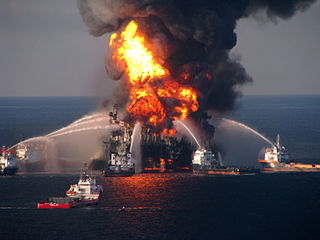Related Research Articles
A gas explosion is an explosion resulting from mixing a gas, typically from a gas leak, with air in the presence of an ignition source. In household accidents, the principal explosive gases are those used for heating or cooking purposes such as natural gas, methane, propane, butane. In industrial explosions many other gases, like hydrogen, as well as evaporated (gaseous) gasoline /petrol or ethanol play an important role. Industrial gas explosions can be prevented with the use of intrinsic safety barriers to prevent ignition.

Gail (India) Limited (GAIL) is Government of India undertaking company. Gail is the largest state-owned natural gas processing and distribution company in India. It is headquartered in New Delhi. It is a state-owned enterprise of the Government of India, under the administrative control of the Ministry of Petroleum and Natural Gas. It has the following business segments: natural gas, liquid hydrocarbon, liquefied petroleum gas transmission, petrochemical, city gas distribution, exploration and production, GAILTEL and electricity generation. GAIL was conferred with the Maharatna status on 1 Feb 2013, by the Government of India. Only eight other Public Sector Enterprises (PSEs) enjoy this coveted status amongst all central CPSEs. GAIL was listed in the 131st position among India's most trusted brands according to the Brand Trust Report 2014, a study conducted by the Trust Research Advisory.
2008 Bangalore serial blasts occurred on 25 July 2008 in Bangalore, India. A series of nine bombs exploded in which one person was killed and 20 injured. According to the Bangalore City Police, the blasts were caused by low-intensity crude bombs triggered by timers.

The Naxalite–Maoist insurgency is an ongoing conflict between Maoist groups known as Naxalites or Naxals, and the Indian government. The insurgency started after the 2004 formation of the CPI-Maoists – a rebel group consisting of the PWG and the MCC. Their origin can be traced when the Communist Party of India (Marxist) split in 1967, leading to the creation of the Communist Party of India (Marxist–Leninist). In January 2005, talks between the Andhra Pradesh state government and the CPI-Maoists broke down and the rebels accused authorities of not addressing their demands for a written truce, release of prisoners and redistribution of land. The ongoing conflict had taken place over a vast territory with hundreds of people being killed annually in clashes between the CPI-Maoists and the government every year since 2005.
Events in the year 2010 in the Republic of India.

Energy resources bring with them great social and economic promise, providing financial growth for communities and energy services for local economies. However, the infrastructure which delivers energy services can break down in an energy accident, sometimes causing considerable damage. Energy fatalities can occur, and with many systems deaths will happen often, even when the systems are working as intended.

On 21 February 2013, at around 19:00 IST, two blasts occurred in the city of Hyderabad, India. The bombs exploded in Dilsukhnagar, a crowded shopping area, within 100 metres (330 ft) of each other. The first explosion occurred outside a roadside eatery named A1 Mirchi, next to the Anand Tiffin Centre and opposite the Konark movie hall, followed by the second one two minutes later near the Route 107 bus stand close to the Venkatadri theatre.
2014 in India refers to notable events that took place in the year 2014 in the Republic of India. Among the notable events were the 2014 Indian general election, in which Bharatiya Janata Party obtained a majority and Narendra Modi was sworn in as the Prime Minister of India. A new state of Telangana was formed. Also in 2014, Mars Orbiter Mission of India successfully entered Mars orbit.
The Andhra Pradesh Reorganisation Act, 2014, popularly known as the Telangana Act is an Act of Indian Parliament that bifurcated the state of Andhra Pradesh into Telangana and the residuary Andhra Pradesh state, due to the Telangana movement. The Act defined the boundaries of the two states, determined how the assets and liabilities were to be divided, and laid out the status of Hyderabad as the permanent capital of new Telangana state and temporary capital of the Andhra Pradesh state.
The 2014 Chennai train bombing is the explosion of two low-intensity bombs on the early hours of 1 May 2014 in a Guwahati-bound train from Bangalore arriving at the Chennai Central railway station, killing one woman passenger and injuring at least fourteen others.
The NTPC power plant explosion was a boiler explosion that occurred on 1 November 2017 at a newly commissioned 500-megawatt unit of the Feroze Gandhi Unchahar coal-fired power plant. The plant is operated by government-owned National Thermal Power Corporation (NTPC) Limited, in Unchahar, Uttar Pradesh, India. The explosion killed 32 people who may have been cleaning ash from the boiler's interior.
The Visakhapatnam gas leak, also referred to as the Vizag gas leak, was an industrial accident that occurred at the LG Polymers chemical plant in the R. R. Venkatapuram village of the Gopalapatnam neighborhood, located at the outskirts of Visakhapatnam, Andhra Pradesh, India, during the early morning of 7 May 2020. The resulting vapour cloud spread over a radius of around 3km, affecting the nearby areas and villages. As per the National Disaster Response Force (NDRF), the death toll was 11, and more than 1,000 people became sick after being exposed to the gas.
References
- ↑ "Blast at a GAIL gas pipeline in Andhra Pradesh, 14 dead:IBNLive Videos". Ibnlive.in.com. Retrieved 18 January 2016.
- ↑ "GAIL Pipeline Blast in Andhra Pradesh kills 22, over 30 injured". IANS. news.biharprabha.com. Retrieved 27 June 2014.
- ↑ GAIL gas pipeline explosion: 14 dead, several injured; Lighting of stove might have sparked fire, say Police | Latest News & Updates at Daily News & Analysis
- ↑ "Fourteen killed in India gas pipeline blast". BBC News. 27 June 2014. Retrieved 23 August 2019.